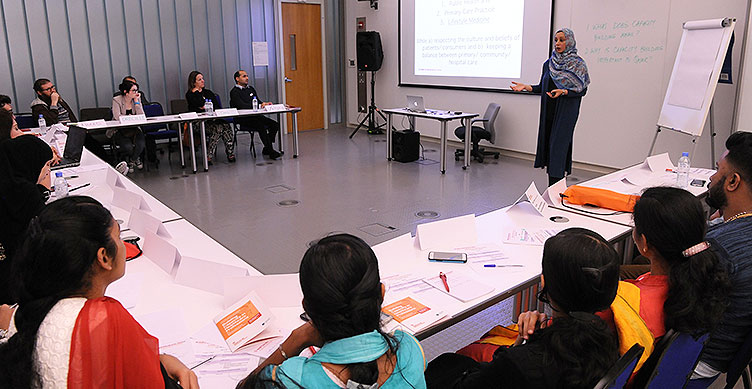Building capacity in the field of healthcare
 Dr. Sohaila Cheema, director of the Institute for Population Health, leads a workshop.
Dr. Sohaila Cheema, director of the Institute for Population Health, leads a workshop.
The symposium was organized by the college’s Institute for Population Health with the collaboration and input from the divisions of pre-medical education and admissions. Held over two days, the event featured workshops that allowed the in-depth study of the topic, along with lectures by world-renowned medical and healthcare experts. The aim was to show delegates that continuous learning and improvement are the basis for capacity building but that related issues like health policy, global education, health practitioner’s wellness, counseling and self-care inform the subject and are directly related to the overall improvement of public health and healthcare.
Subjects for the workshops were varied, and included Peter Martin, the interim chair of graphic design at Virginia Commonwealth University in Qatar, discussing the impact that design has on the development of healthcare, and WCM-Q’s own Dr. Ravinder Mamtani and Dr. Sohaila Cheema leading a discussion about lifestyle medicines. Other workshops covered a systems approach to capacity building and lifelong learning by Dr. William Bozeman from the University of Central Florida, social media research and practice in health by Drs. Luis Luque and Ingmar Weber from the Qatar Computing Research Institute-Qatar. From WCM-Q, Dr. Alan Weber spoke about narrative medicine and Ms. Maha Elnashar and Ms. Huda Abdelrahim focused on cultural competence.
Dr. Mamtani, professor of healthcare policy and research and senior associate dean for population health and capacity building, said the symposium had been a great success, attracting professionals from every sector of healthcare in Qatar.
Dr. Mamtani said: “We are interested in supporting programs and activities that can help Qatar move forward and that’s a commitment we have given to Qatar and its healthcare practitioners.

“I think that one of the most important lessons to have come out of the symposium was the ever greater need for inter-professional collaboration and lifelong learning. Healthcare sectors should strive for a greater understanding of their colleagues’ roles, and in doing so they will have a very positive impact on patient care. Similarly, the world today is moving very quickly; medical research is constantly producing new therapies, techniques and examples of best practice and it is vital for healthcare workers to stay abreast of developments for the benefit of their patients.”
Dr. Javaid Sheikh, dean of WCM-Q, spoke about developing innovation in the training of healthcare professionals, and the megatrends like climate change, non-communicable diseases, and urbanization, that are impacting healthcare - and the need for healthcare education to evolve to address those trends.
Dr. Sheikh also said that there needed to be a sea-change in the way that medicine is taught; there should be a greater focus on population health, competency-based training rather than time-based training, and an overhaul in the learning of information systems.
Dr. Arthur Hengerer board chair for the Federation of State Medical Boards in the US, spoke about the importance of physician wellness and burnout, and stressed the need for an open and transparent medical environment, where concerns could be raised without fear in order to protect patient safety.
Dr. Hengerer also said that physicians should be conscious of burnout and alleviate the stress of their work by improving communication channels with their colleagues, ensuring they have a clearly-defined work-life balance and fostering strong relationships outside of work, among other strategies.

The subject of biomedical research was tackled by the world-renowned Dr. John Ioannidis, CF Rehnborg chair in disease prevention, and professor of medicine and of health research and policy at Stanford University in the US. Dr. Ioannidis postulated that biomedical research has endemic problems and that researchers need to be more rigorous in their search for answers. Dr. Ioannidis quoted figures that showed 96 per cent of research claimed to have found “significant” results, a statistic he said suggested “extreme reporting bias”.
Dr. Ioannidis also said there were problems with researchers cherry picking the best hypotheses so as to achieve positive results, that there was little replication of studies to ensure veracity and that data was usually not shared. There was also a question over whether some research was worthwhile.
Dr. Ioannidis ascribed a lack of funding, and strong competition for that funding for the problems within current biomedical research, but said researchers should first ask themselves questions before embarking on a study. These questions included whether the proposed study was long enough and large enough to elicit useful information, does the research reflect real life, and are the methods, data and analysis verifiable and unbiased.
The symposium was concluded with a question and answer session featuring all of the speakers.
Dr. Sohaila Cheema, director of the Institute for Population Health and co-chair for the symposium, said it had been a well-received and intellectually thought-provoking event. Dr. Cheema said: “It was heartening to see so many fellow healthcare professionals from different disciplines; nurses, paramedics, counselors, health executives, therapists and healthcare workers as well as physicians and researchers. This created an excellent environment for the dissemination of knowledge and experiences, and allowed different perspectives to be heard on how to build capacity in Qatar’s healthcare arena.”
Dr. Rachid Bendriss, assistant dean for student recruitment, outreach and foundation programs and co-chair for the symposium said: “The symposium provided an open forum for a lively exchange of knowledge and ideas on developing human capacity in Qatar. Hosting prominent global speakers at the symposium exposes our local healthcare practitioners and students to a variety of current topics and trends that impact healthcare and inspires our students to strive for excellence.